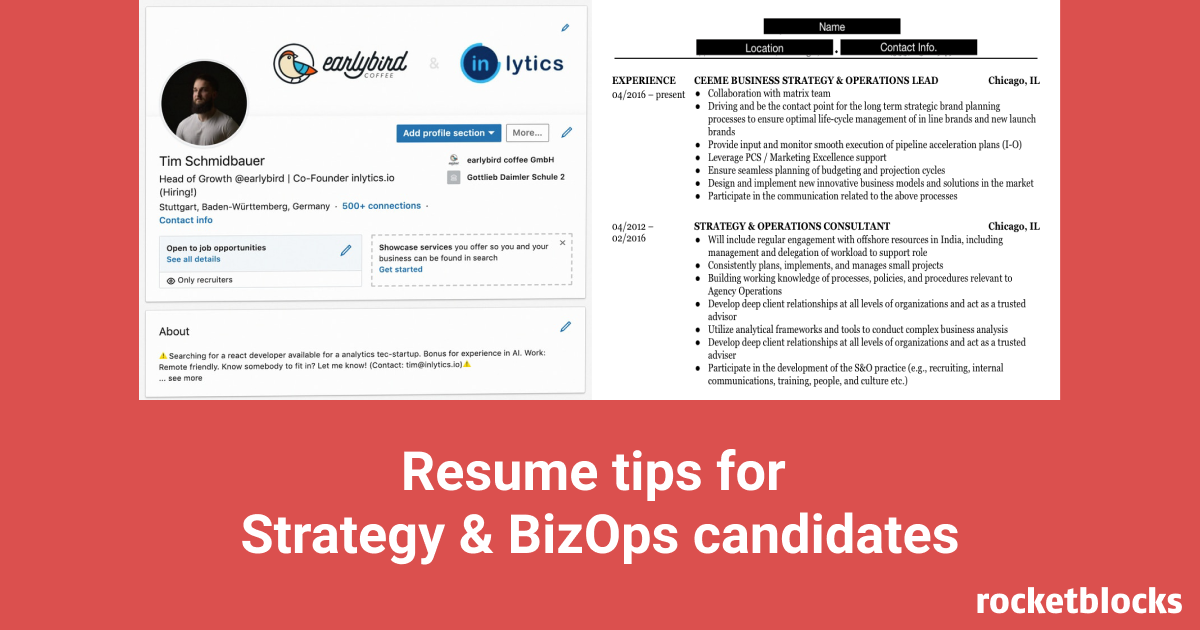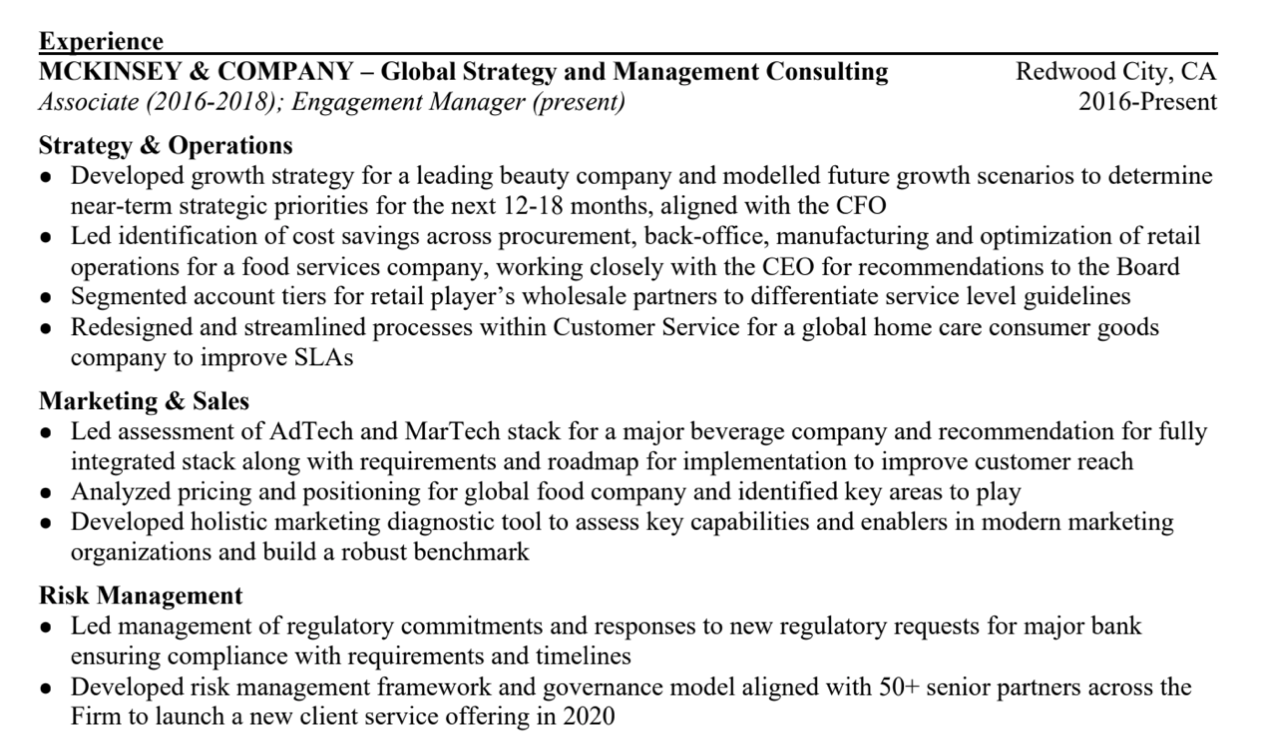How to write a GREAT Strategy & BizOps resume
Covers strategy & bizOps resume fundamentals and how to make it stand out.
|
|
|
Hard skills | Soft skills | Grey areas | Company specifics | Ideal candidate
BizOps roles are highly leveraged positions that require a vast set of skills to succeed.
Your resume needs to show that:
- You have the hard skills (or that you can easily learn them).
- You can excel in highly cross functional and uncertain environments - in other words, you have proven to excel in the soft skills arena.

In this post, we focus on how to best highlight these two points. Before you start, it’s helpful if you know the basics of writing a great resume. Luckily, we’ve already written about it (drafting your master resume and customizing and enhancing your resume). Reading these two posts gives you a good starting point on the principles of resume creation. Now, let’s go over the specifics of the BizOps resume.
Hard skills: Use a straightforward approach (Top)
You need to show that you have the hard skills to do the job. Hard skills are mostly tangible - you either have them or you don’t. If you have them, what is your level of experience and expertise? You want to show that you’ve mastered these skills (or at least are familiar with them). In a BizOps role, key hard skills are, amongst others, financial modeling, business case building, querying, data visualization.
- Do you have them? If so, show it on your resume. Make it tangible that you have them, be specific. Don’t just say “created dashboards for leadership team”, say “created Revenue and Cost dashboards for leadership team to provide focus and accountability, driving performance improvements of x%”. Being objective and quantifying (as much as possible) is important. It’s not just about doing the work, but showing that your work has an impact.
- Don’t have them? Show why it’s not a problem. Show that you’ve taken steps to bridge this gap or show skills similar to the ones required. For example, under your education add a business finance or valuation certificate. Don’t have a certificate? Show familiarity with the key topic. For example, show how you’ve mastered excel through self learning (a good proxy for your ability to learn SQL).
Got a BizOps interview?

"Rocketblocks was pivotal to landing my offer doing strategy and business operations at LinkedIn. There's not many resources out there that dive into the topic with such extensive drills and specific tech cases." -- Jane Wu, LinkedIn BizOps
Soft skills: The devil is in the details (Top)
Soft skills are less tangible, but that doesn’t make them less important. These include communication, influence, decision making, teamwork, and many others. How do you make these stand out? Play to your strengths. Focus on a few that are specifically requested for the role (e.g., mentioned in the job requirements), the ones you do have. Capitalize on those skills. The trick is that you can’t just say you have great soft skills, or rank them on a 1-10 scale. The way to show these has to be smoother, through keywords and descriptions. Here are a few examples:
- Communication: “Prepared key communications to share financial plan for all the company - from CEO to the field”
- Influence “Drove alignment with c-suite for company’s 3 year strategy to capitalize on new market opportunities resulting in x annualized growth”
- Decision making: “Selected vendor for main CRM tool to support team of x - from biz case to contract signature - aligned with business goals with expected ROI of y”
- Teamwork: “Led cross functional team to implement new processes across x teams to drive performance up by y%”
Regardless of the examples and specific skills highlighted, the point is that soft skills can be made tangible in an intangible way. Be deliberate about this and make sure you have examples.
The grey areas (Top)
Aside from direct hard skills and soft skills, such as the ones mentioned above, there are areas of expertise you also want to highlight. These include Strategy, Operations, Project Management, Insights, amongst others. These can either fall within hard or soft skills, or have a little of both. A smart way to include these is to create subdivisions in your resume, such as the example below.

The great advantage of this approach is that it helps the recruiter and hiring manager to quickly focus on what they care about most. It also allows you to showcase these skills in a direct way. The alternative of listing experience just by title or role has the disadvantage of less clarity - the lack of grouping makes it harder to understand what is what.
Know what the company is looking for (Top)
In 90% of cases, companies are looking for someone who can do the job and has growth/ leadership potential. In BizOps, it’s no different. Skills and experience work as a proxy for that, but there are other ways to show it. Understanding the culture of the company and the team and what the hiring manager is looking for helps frame this. Is the company known for being formal? Are they known for being proud of their highly intellectual ability? Does the company pride itself on harnessing a relaxed environment? Or do they emphasize creativity?
Understanding these nuances can be hard from the outside, but researching about the company, reading reviews, talking to folks that work there or are familiar with the industry, and probing the recruiter, are good ways to go about it. Once you have a sense for the company, you can tailor your resume accordingly. For example:
- Formal environment: Emphasize institutions and experiences that require exposure in formal environments. For example, if you have a well known corporate company in your resume like McKinsey, BCG, or Goldman Sachs it’s straightforward to show it. If you don’t, make sure to bring to life examples that clearly highlight experiences that require a certain degree of formality. For example, presenting to clients, to the CEO of your company, defending your master thesis, or defending a proposal within your community, are all ways that require some degree of formality and show that you’re comfortable being put on the spot.
- Intellectually driven environment: Showcase intellectual ability through scholarly achievements such as the university you attended, scholarships, awards, and other prizes; and other achievements such as standardized exams like the GMAT. By default, most BizOps roles require top academic achievements, and many times, for better and for worse, an MBA is even a requirement.
- Relaxed environment: Highlight projects that are not only work specific - volunteer projects or team morale events that you’ve organized. Looker (before being acquired by Google) is a well known example of a relaxed environment, with an office in Santa Cruz having room for surfboards.
- Creative environment: Share personal interests and hobbies such as playing the guitar, traveling the world, drawing, or anything that speaks to your creative side. At Gusto, there is a culture fit interview called the “watermelon interview”. This interview's only purpose is to assess if the candidate is a good fit for the company or not, which includes knowing what the candidate does outside of work - a good opportunity to show a special talent.
The ideal candidate is *not* real (Top)
Thinking about how your resume compares to others and to what the company is looking for is a tough exercise for anyone. One thing that helps is to remind yourself that the ideal candidate does not exist. Never be discouraged if you feel like you're not the “ideal candidate”. The ideal candidate is only a concept to help frame the role, job description, and for hiring managers and hiring teams to align against. It doesn’t exist because no one is perfect and what is defined as ideal by the company is based on their reality. No one knows what each candidate has to offer. It’s good to have this concept in mind, but it’s important not to get stuck on it and look for areas to shine outside of preconceived boundaries.
Final remarks
Enhancing your resume for a BizOps role is just part of a successful application. Make sure you have a narrative, a story of who you are, what you’ve done, and what you’re looking for. Ideally, these two - your resume and your story - not only align but are complimentary. By looking at your resume, the recruiter knows what you’ve done but doesn’t know “the why”. By talking to you, the recruiter knows you but doesn’t have all the details. Make the two work as one which increases your chances of success.
P.S. Are you preparing for Strategy & BizOps interviews?
Get real interview questions. Learn from sample answers from BizOps leaders with experience at Google, Uber, Opendoor & more. Plus concept reviews and premium 1-on-1 Expert coaching.



